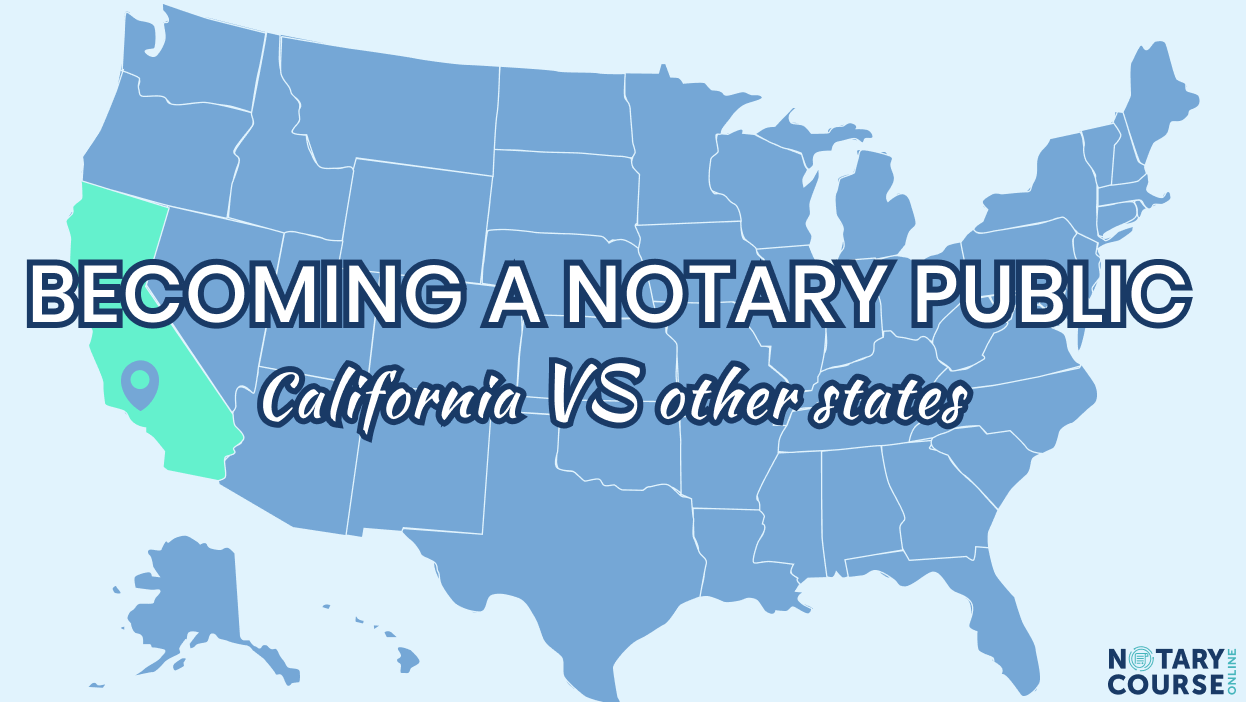California
Blog
7 Steps: How to Becoming A Notary in California

-
by Notary Course Online
- September 9, 2024
Introduction
Notaries play a crucial role in California’s legal and business landscapes. They act as impartial witnesses to the signing of important documents, ensuring the authenticity and legality of various transactions. Their duties include administering oaths, affirmations, and performing jurats. Given the diverse functions they fulfill, becoming a notary in California can be a rewarding career choice.
The process to become a Notary Public in California involves several steps designed to ensure that only qualified individuals receive this important commission. Navigating through these requirements might seem daunting at first, but breaking it down into manageable steps can simplify the journey. For a comprehensive guide on this process, refer to our detailed article on the 7 Steps to Becoming A Notary in California.
This article aims to provide you with valuable insights into the notary profession in California. We cover a wide range of topics such as:
- Can you notarize for a family member? Find out in our article about notarizing for family members.
- What challenges do mobile notaries face? Discover more in our piece about what mobile notaries come up against.
- Why is location important for mobile notaries? Learn more in our article Location, Location, Location: Mobile Notaries Cover It.
Additionally, if you’re looking for tips to enhance your notary practice, our Notary Public Tips category offers a wealth of resources.
By following these steps and utilizing these resources, you’ll be well on your way to becoming a successful Notary Public in the state of California.
Step 1: Complete the Required Education
To become a notary in California, your journey begins with completing a mandatory 6-hour training course. This foundational step ensures you are well-versed in the duties and responsibilities of a notary public.
Overview of the 6-Hour Mandatory Training Course
The 6-hour course for notaries covers essential topics like:
- Notary laws and regulations.
- Ethical practices.
- Proper documentation procedures.
- Recognizing fraud.
This comprehensive course aims to equip you with the knowledge needed to perform notarial acts accurately and legally. For instance, understanding the nuances of Jurat stamps and California pocket embossers can significantly enhance your notarial skills.
Importance of Selecting California Secretary of State-Approved Courses
Choosing a course approved by the California Secretary of State is crucial. These approved courses meet state standards and ensure that you receive accurate, up-to-date information. Unapproved courses may leave gaps in your education, which can lead to mistakes or legal issues down the line. It’s also important to be aware of the California Secretary of State’s disciplinary actions guidelines for notaries public, as these can provide valuable insights into maintaining compliance and avoiding pitfalls.
Options for Online and Self-Paced Courses
Many approved providers offer online and self-paced courses, making it easy to fit your education into a busy schedule. Popular options include:
- California Notary Classes Online: Offers timed lessons, downloadable workbooks, and practice tests.
- Notary Course Online: Provides flexible learning with self-paced resources and instant proof of completion.
Both platforms have positive reviews and are licensed by the California Secretary of State (#607657 and #307658). Prices typically range from $39.99 for the 6-hour course to $29.99 for refresher courses.
This initial step lays the groundwork for your notary career, setting you up for success in subsequent steps.
Step 2: Register for the Notary Public Exam
Registering for the notary public exam is a critical step in your journey to becoming a notary in California. To ensure a seamless registration process, follow these steps:
- Visit the California Secretary of State’s Website: Navigate to the official website and locate the “Notary Public & Apostille” section.
- Access the Registration Portal: Click on the link provided for state exam registration. This will redirect you to the CPS HR Consulting website, which handles the scheduling of exams.
- Create an Account: If you’re a new user, create an account by providing your personal information. Returning users can simply log in using their existing credentials.
- Choose an Exam Location and Date: Select a convenient location and date from the available options. The exams are held at various locations across California.
- Pay the Exam Fee:
○ New Applicants: $40
○ Reapplicants: $20
- Confirm Your Registration: Review all entered information and confirm your registration to receive a confirmation email with further instructions.
What to Expect on the Exam
The notary public exam consists of 45 questions that cover various topics related to notarial practices and laws specific to California. You need to score at least 70% to pass, and the exam includes multiple-choice questions that test your understanding of notary procedures, legal requirements, and ethical considerations.
Preparation is key. Consider using study guides or practice tests offered by approved course providers to elevate your chances of success. For comprehensive resources on how to prepare for this crucial exam, you might find this ultimate guide helpful.
By following these steps, you’ll be well-prepared for your upcoming state exam.
Step 3: Pass the Notary Public Exam
The notary public exam is a crucial step in becoming a notary in California. This test consists of 45 multiple-choice questions, designed to evaluate your understanding of notary laws and procedures.
Exam Format and Requirements
- Format: The exam includes 45 multiple-choice questions.
- Passing Score: You must achieve a score of 70% or higher to pass.
Tips for Effective Preparation
- Understand the Material: Focus on understanding the key concepts covered in the 6-hour mandatory training course, including notary laws, ethics, and best practices.
- Use Study Guides: Utilize state-approved study guides and practice exams to familiarize yourself with the exam format.
- Take Practice Exams: Practice exams can help you identify areas where you need improvement and get comfortable with the question format.
- Time Management: During your preparation, practice managing your time effectively to ensure you can complete all questions within the allotted time.
By concentrating on these preparation strategies, you increase your chances of passing the state exam and moving forward with your notary public application process.
Step 4: Submit Your Notary Public Application
Completing and submitting the notary public application is a crucial step in becoming a California notary. This process ensures that your credentials are properly reviewed and verified by the California Secretary of State.
Steps to Complete and Submit Your Application:
1. Download the Application Form: Obtain the official notary public application from the California Secretary of State’s website.
2. Fill Out Personal Information: Provide accurate details such as your name, address, contact information and include 2 passport photos as required..
3. Education Details: Include proof of completion for the mandatory 6-hour training course.
Step 5: Undergo a Live Scan Background Check
The background check for notaries is a crucial step in ensuring the integrity and trustworthiness of all notary publics in California. The state mandates that all applicants undergo a Live Scan process, which involves fingerprinting and submitting these prints to the Department of Justice (DOJ) and Federal Bureau of Investigation (FBI).
How to Find a Live Scan Service Provider
You can locate a Live Scan service provider through:
- The California Department of Justice website, which provides a searchable database of approved providers.
- Local law enforcement agencies, such as police departments or sheriff’s offices, often offer Live Scan services.
- Private businesses authorized to provide Live Scan services.
Timeline and Costs Associated with Background Checks
The cost for a Live Scan background check varies but generally ranges between $70 to $100. This fee includes:
- Rolling fee charged by the Live Scan operator (typically between $20-$30)
- DOJ processing fee ($32)
- FBI processing fee ($17)
After completing your Live Scan, results are typically processed within 72 hours. However, delays can occur, so it’s advisable to complete this step as soon as possible after passing your exam.
Promptly undergoing your background check ensures you stay on track with the application timeline and receive your commission without unnecessary delays. Remember, it’s essential to double-check then triple-check all details during this process to avoid any potential issues.
After successful submission and approval of your notary public application and background check, you will receive a commission packet from the California Secretary of State. This packet typically includes:
- Commission Certificate: Verifies your appointment as a notary public.
- Oath Form: Must be signed and filed with your local county clerk’s office.
- Authorization to Manufacture Notary Seals: Allows you to purchase an official notary seal from authorized manufacturers.
- List of Authorized Seal Manufacturers: Ensures you get your seal from a legitimate source.
Properly submitting your notary public application sets the stage for receiving these critical documents, which formalize your role as a commissioned notary in California.
If you’re considering this path, it’s worth exploring why becoming a notary in California is a viable career choice. The demand for notaries is high, and there are numerous advantages to this profession including significant earning potential.
After you’ve received your commission packet and become a licensed notary, you’ll find yourself in high demand. To help navigate this new career, consider checking out some resources on notary services in California or visiting our notary public blog for the latest news, tips, and articles related to the field.
Lastly, if you’re ever in need of finding a notary nearby, resources are available online to assist you in locating a notary near you.
Step 6: Obtain Your Notary Supplies
Securing the correct notary supplies is crucial for your new role. Essential items you need include:
- Notary Seal: This is used to authenticate documents and must be obtained from an authorized manufacturer.
- Notary Bond: A $15,000 bond is required by law to protect the public from any potential errors or misconduct.
- Notary Journal: This records all notarizations you perform, ensuring a detailed log of your activities.
For purchasing these supplies, you have a few options:
- Local Stationery Stores: Convenient but ensure they are authorized providers.
- Authorized Manufacturers: These suppliers are listed in the commission packet from the California Secretary of State. Utilizing authorized manufacturers guarantees compliance with state requirements.
Acquiring these supplies promptly after receiving your commission packet ensures you’re ready to begin your duties without delay. You can find high-quality California notary supplies at Notary Course Online which includes seals, journals, and more essential items for your professional needs.
Step 7: File Your Oath and Bond
To finalize your notary commission, you must file your oath of office and bond at your county clerk’s office within 30 days of your commission start date.
Steps to File Your Oath and Bond:
- Prepare Required Documents:
○ Gather your commission certificate, the $15,000 surety bond, and the completed oath of office form.
- Visit Your County Clerk’s Office:
○ Locate the nearest county clerk’s office. It’s essential to visit in person to ensure all documents are correctly filed.
- File the Documents:
○ Present the commission certificate, bond, and oath form. The clerk will administer your oath of office and officially file your bond.
- Pay Filing Fees:
○ Be prepared to pay any filing fees associated with this process. These fees can vary by county.
Importance of Timely Filing
Filing within the required timeframe is crucial. Not filing within 30 days renders your commission invalid, necessitating a new appointment process. Timeliness ensures that you can begin performing notarial acts without delays or legal issues.
Conclusion
Becoming a notary in California involves a detailed process, but the rewards are significant. To ensure a successful commission period:
- Maintain ongoing education: Regularly update your knowledge to comply with state regulations.
- Stay compliant: Adhere to all legal requirements and deadlines to avoid penalties.
Consistent learning and adherence to guidelines enhance your professional credibility. These steps will guide you effectively through the 7 Steps: How to Becoming A Notary in California.
Frequently Asked Questions
What is the required education for becoming a notary in California?
You must complete a mandatory 6-hour training course that is approved by the California Secretary of State. It is important to select courses that are recognized by the state, and there are options available for online and self-paced learning.
How do I register for the Notary Public Exam?
To register for the Notary Public Exam, you need to follow specific steps outlined by the state. The exam registration involves paying fees ($40 for new applicants and $20 for reapplicants) and preparing for an in-person test.
What should I expect on the Notary Public Exam?
The Notary Public Exam consists of 45 questions, and you must achieve a passing score of 70% or higher. It's advisable to prepare thoroughly using study materials and practice tests to ensure success.
What is involved in the Live Scan background check?
The Live Scan background check is a requirement for all notaries. You will need to find a Live Scan service provider to complete this process, which includes associated costs and timelines that vary based on your location.
What supplies do I need as a notary public?
As a notary public, you will need essential supplies including a notary seal and journal. These can be purchased from local stationery stores or authorized manufacturers.






 Congratulations!
Congratulations!